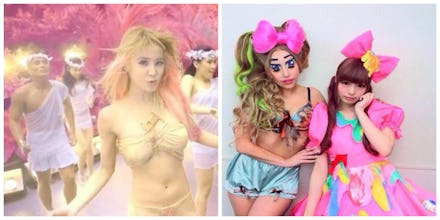Cultural Appropriation Isn't an American Problem

Evoking Asian culture seems to be in vogue these days. Just last week, media pundits were quick to comment on why Katy Perry's geisha-themed performance at the American Music Awards was "racist." The Wall Street Journal's Jeff Yang went so far as to describe it as a "full-barreled technicolor assault on a quarter-millennium-old set of traditions."
I agree with Yang that Perry's performance was insensitive. But issues surrounding cultural appropriation are not unique to America. In Asia, celebrities are often influenced by images from Western culture, too, as can be seen when they dye their hair blond or infuse their performances with musical elements taken from hip-hop and rap. And Asian artists' use of Western culture is rarely met with the same scrutiny as that of their American counterparts.
There is nothing inherently wrong with drawing artistic inspiration from other cultures, so long as it is done with respect and a sense of humility regarding one's appreciation and understanding of those cultures. Problems stem from the fact that artists often use images whose cultural relevance they may not completely understand. The result, whether intentional or not, often reduces other cultures to demeaning stereotypes that insult certain populations.
Perry is only one of many American celebrities to have used Asian culture for entertainment purposes. During her recent tour in Japan, Lady Gaga appeared on a television show "kawaii'd out of her mind." Her big, fake blue eyes, outrageous hair, and fluttering wings scared even Japanese audiences, as they questioned whether or not she was mocking them. The Japanese are renowned for cosplay, or dressing up as anime characters, and an obsession with kawaii (cuteness) is a large part of this culture. Lady Gaga, like Katy Perry, claims that she's a "Japanophile," but her stereotypical costume defied explanation.
Uma Thurman also recently sparked criticisms for her calendar shoot for a liquor company. In one shot, Thurman dons a kimono and poses with cherry blossoms, while in another she is seen resting on a lion's head in a red dress with red lanterns hanging above her — an obvious allusion to Chinese culture.
All of these celebrities have received their share of criticism for engaging in "cultural appropriation." However, they represent only one part of a larger phenomenon that extends far beyond the American entertainment industry.
Last year Taiwanese pop singer Jolin Tsai released a hit song, "Fantasy." In the music video, her back-up singers are dressed as Greek gods and goddesses, and together they dance to modern beats in a Garden of Eden-themed backdrop. The music video is replete with imagery from Western mythology (including unicorns). At one point, there's even a hunky, bare-chested man with a floral wreath in his hair who gets pinned against a cross. Despite all this, the video was not seen as an assault on Western civilization or Christianity by the Taiwanese media.
A few years ago, Ai Yi-Liang, a contestant on Super Idol Taiwan, performed Beyonce's "Naughty Girl" while dressed in a full-on belly-dancing ensemble. The performance mixed classic R&B with inspiration from Middle Eastern harems; Yi-Liang shook her hips sensually and grinned at the camera before breaking into a beat-boxing rendition of the song accompanied by a saxophone player.
Images from Western and African American culture have been normalized and mainstreamed in Asia (I grew up in Asia watching Hollywood movies and listening to Destiny's Child). As such, it seemed perfectly normal for Jolin Tsai to dance with Greek gods and for Ai Yi-Liang to shake her booty like Beyonce.
K-pop singers have also been under the spotlight recently for their evocations of other cultures. Boy bands like Big Bang have been criticized for their overuse of African American styles like rap and R&B, and it is also common for singers to dye their hair blond. But it's a bit of stretch to say that these are examples of "cultural appropriation," since musical genres such as hip-hop have become part of a global culture. Moreover, whereas it's imperative for American artists to be self-confident in order to succeed in the industry, K-pop stars have to appear modest in order to maintain their fan base. Having too much "swag" is seen as insulting and off-putting behavior. So despite the badass bandanas and blond hair, the lyrics and the sentiment expressed by these artists are still distinctly Korean.
While artists may draw inspiration from different cultures, there's a fine line between respectful homage and appropriation. Celebrities are masters at publicity who will often do anything to get people talking about them — and the topic of race always generates conversations. Rather than criticize these artists, however, it's perhaps more useful to more closely examine the ways in which celebrities from around the globe frequently evoke cultures that are not their own. By creating a better working dialogue between artists of different cultural backgrounds, we can learn more about the power and influence that cultural images have in the entertainment industry, and think of more productive ways to rectify the issues that emerge from being lost in translation.